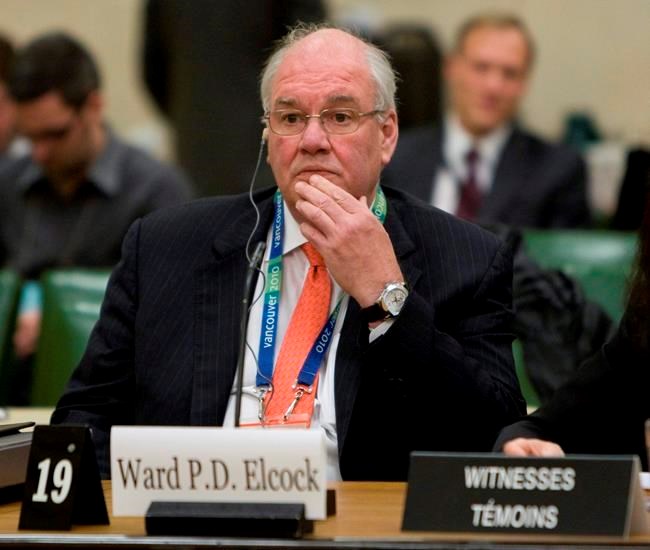OTTAWA — The Canadian Security Intelligence Service's interpretation of what constitutes a national security threat is not relevant when it comes to a government's decision to invoke the Emergencies Act, two of the spy agency's former directors testified at a national inquiry Wednesday.
Ward Elcock, who led CSIS from 1994 to 2004, and Richard Fadden, who led the agency between 2009 and 2013, both told the Public Order Emergency Commission that any reference to the CSIS Act should be removed from the Emergencies Act.
The commission is probing the decision of Prime Minister Justin Trudeau's Liberal government to invoke the Emergencies Act during the "Freedom Convoy" protests last winter and has a mandate to offer recommendations to modernize the legislation.
The CSIS definition of a national security threat is written into the Emergencies Act as one of the requirements for the government to declare a public order emergency.
It includes espionage or sabotage of Canada's interests, foreign influence, acts of serious violence against people or property with political, religious or ideological objectives, or the violent overthrow of the Canadian government. It also specifically excludes lawful advocacy, protest or dissent, unless it is happening in conjunction with any of those activities.
Over six weeks of fact-finding testimony, the commission heard that CSIS did not believe the protests that blockaded downtown Ottawa and several U.S. border crossings met the threshold of being a threat to Canada's security — at least in the context of its own operations.
Elcock said CSIS would need to interpret that definition very differently as an intelligence agency than cabinet would when it comes to deciding whether to declare a national emergency.
He said CSIS interprets the definition in terms of the limitations on its activities as an intelligence service. "None of those things are relevant to the discussions of cabinet or to the issues that a cabinet might debate," he testified.
Fadden said the CSIS definition is, appropriately, very narrow and precise.
"What this has to do with the declaration of a public order emergency escapes me entirely," Fadden said.
Both argued the government should redefine national security threats in the Emergencies Act, and could expand that to include threats to the economy and those posed by climate change.
The issue of how a national security threat should be defined in the Emergencies Act has become central to the commission's work to determine whether the federal government was justified in invoking the act to deal with the protests.
Prof. Leah West, a national security law expert with Carleton University and a former Department of Justice lawyer for CSIS, argued Wednesday the protests did not meet the legal threshold.
"We should ask ourselves whether unlawful and even violent protests typically give rise to what we call a national security threat under the law in this country. Did we label the G8 and G20 protests in Toronto a national security or terrorist threat?" she posed to the commission.
"Similarly, we have never labelled blockades and other non-violent but illegal means of obstructing critical infrastructure as terrorism."
The experts on the panel told the commission that politicians typically do not take national security seriously enough. A lack of political will stifles good system-wide co-ordination of intelligence sharing between agencies, said Fadden, who also served as national security adviser to the prime minister between 2015 and 2016.
"I started working in this area under Jean Chrétien, who was driven screaming and yelling into having to deal with 9/11 because his priorities were social and economic, they weren't national security," Fadden said.
"Mr. (Stephen) Harper's were economic, they weren't national security, although he had to deal with Afghanistan. And I think it's fair to say that Mr. Trudeau became prime minister not expecting to have to spend a lot of time, money and effort on national security."
He implored the commissioner to persuade the government that the events of last winter are unlikely to be unique and there will be more disruptive events domestically and internationally. Officials need to accept that national security is important, he said.
On Wednesday afternoon, an expert roundtable on policing protests discussed how to make sure police agencies work together more effectively during large scale events such as the weeks-long convoy protest in Ottawa.
Robert Diab, a law professor with Thompson Rivers University, suggested looking to existing legislation on intergovernmental conferences for some solutions.
For example, legislators could assign particular police agencies to take over certain types of events, he said. That's the case during international summits, when RCMP are always responsible for security.
University of Ottawa criminologist Michael Kempa said the problem is that there may not always be agreement about what kind of event police are dealing with. He suggested instead creating a threshold system that could automatically determine if provincial police or RCMP need to take over when an operation reaches a certain size or threat level.
"It removes the implication that the municipal police service is failing in some way," Kempa said.
During international meetings, existing law allows the RCMP to block off large public areas without invoking an emergency, something Diab said legislators should consider allowing police to do under certain other circumstances.
If the conditions of such restrictions were predictable and established under legislation, the process would be more transparent, he argued.
The panel also discussed a potential protocol that could be developed to dictate how police services work together during a protest.
The commission is hearing from dozens of expert witnesses this week on issues ranging from misinformation to police powers as part of the policy phase of its work.
The commissioner, Justice Paul Rouleau, has until Feb. 6 to deliver his findings to the federal government, with the report to be made public by Feb. 20.
This report by The Canadian Press was first published Nov. 30, 2022.
Laura Osman, The Canadian Press



